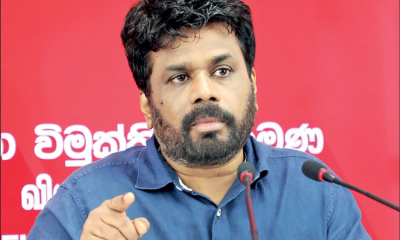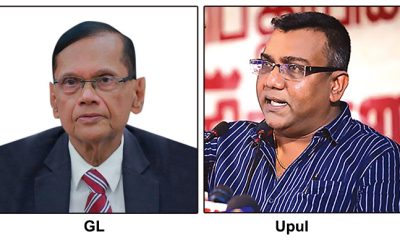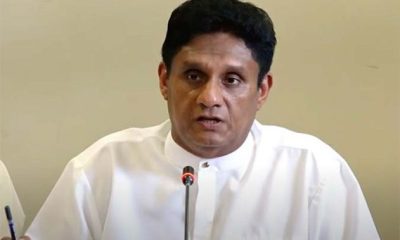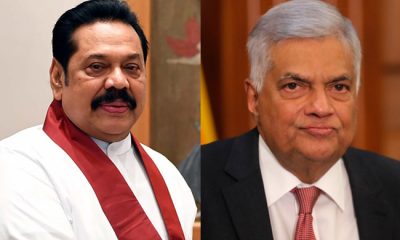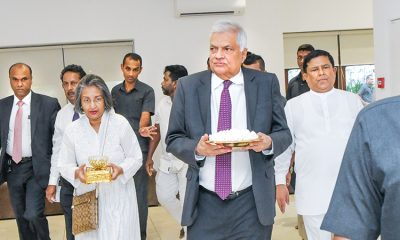Editorial
Of that high drama

Monday 26th June, 2023
It has been revealed before the COPE (Committee on Public Enterprises) recently that Sathosa suffered a loss of about six billion rupees due to rice imports in 2015 because most of the stocks of imported rice had to be sold as animal feed at extremely low prices. These losses are passed on to the public in the form of tax and tariff hikes, and fund cuts for vital sectors such as education, health and social welfare.
Sathosa often makes headlines for the wrong reasons; it has become synonymous with corrupt practices, and this is the main reason why its potential to compete with the private sector for the benefit of the ordinary public cannot be fully tapped.
Reams have been written about mega import rackets Sathosa is involved in, but racketeers carry on regardless and enrich themselves thanks to their political connections and the prevailing culture of impunity. This unfortunate situation has come about because government leaders and top bureaucrats are in league with a cartel of big-time rice millers, who are free to further their interests at the expense of Sathosa—the state coffers, to be exact.
As harvesting seasons near, the wealthy millers hoard paddy, creating a shortfall in the supply thereof and making governments import rice. Politicians and their lackeys in the key positions of Sathosa, etc., stand to gain. When imported rice arrives, the millers begin to release their stocks to the market slowly, causing the prices of rice to drop temporarily and buy paddy for a song.
They prevent competition in the paddy market by making banks and other financial institutions delay the loans that small-time millers apply for. When locally-produced rice is made freely available, people stop consuming imported rice, as former Minister Dayasiri Jayasekera rightly told the COPE, the other day; local rice agrees with Sri Lankans’ palates more than imported varieties, as is public knowledge. When this happens, huge consignments of imported rice rot in warehouses and are sold as animal feed. In the meantime, crafty millers reduce rice supplies, jack up prices and make a killing. This is the name of the game.
Ways and means of ending the exploitation by the powerful millers of the rice grower and consumer alike have been proposed over the years. Ideally, the millers’ cartel has to be crushed as a nation priority, but its slush funds prevent governments from resorting to such stringent action. The Paddy Marketing Board has to be revitalised urgently for the government to maintain adequate stocks to regulate the prices of paddy and rice. Steps have to be taken to ensure that banks, etc., make funds available to small-time millers ahead of the harvesting seasons so that they can buy paddy and sell rice at competitive prices.
Rice should be imported only when there is a sharp drop in the national paddy production and not when the millers’ Mafia hoards paddy and starves the rice market. We are not short of politicians who take pride in having crushed the LTTE and wrested control of the areas that it had kept under its rule, but there are still some uncleared areas, which need to be liberated; they are the sprawling warehouse complexes of the powerful rice millers, who keep huge paddy stocks in their silos to manipulate the paddy and rice markets.
The Sathosa rice racket must be probed and the culprits brought to justice, but the problem is that it was carried out during the UNP-led Yahapalana government, of which the SLFP-led UPFA was the second biggest constituent, and the two parties have joined forces with the SLPP, whose leaders screamed blue murder, calling for action against the Yahapalana crooks. Most of the current SJB MPs were in the Yahapalana government, which was also backed by the JVP and the TNA.
Thus, one can shout until one is blue in the face, but it is highly unlikely that the current Parliament will take any action against those who carried out the rice racket at issue. One can only enjoy the moments of high drama when corrupt deals are exposed at COPE meetings, without being so naïve as to expect the culprits responsible for them to be prosecuted, much less punished.
Editorial
Dulling the pangs of hunger

Saturday 5th April, 2025
The government has, with the help of the National Food Promotion Board, the Ministry of Health and the Ministry of Agriculture, launched a programme to provide the public with nutritious food at reasonable prices as part of its Clean Sri Lanka initiative. The public, fleeced by private eatery owners ruthlessly, will surely benefit from this programme, which deserves praise. It will also help improve the government’s approval rating significantly. A way to a person’s heart is said to be through his or her stomach.
A widely-held misconception is that every prospect pleases in this country, and only politicians are vile. True, most politicians are thought to be bad, but it is not fair to single them out for castigation. There are many others who are either equally bad or even worse. The blame for people’s hardships due to the high cost of living should be apportioned to the business community, given to unconscionably exploitative practices; its members, from wayside eatery owners to corporate fat cats, jack up the prices of their products and services according to their whims and fancies, at the expense of the public. The rice millers have become a law unto themselves.
Why food inflation is high is not difficult to understand. A plain hopper is priced at Rs. 25, and an egg costs about Rs. 30 at present, but an egg hopper is sold at Rs. 100! Food prices that went into the stratosphere at the height of the economic crisis in 2022 have not come down significantly owing to the greed of the unscrupulous members of the business community.
The government initiative to make quality food available at reasonable prices to the public should continue, and it is hoped that the NPP leaders will also develop the Hela Bojun Hala (HBH) restaurant chain under the Ministry of Agriculture. These eating places not only sell nutritious food made from local ingredients at very reasonable prices but also economically empower women. All HBH outlets are run by women and do not sell wheat flour products or sugary drinks.
The NPP government can give a turbo boost to the HBH programme by expanding it across the country. That will help provide direct employment to many more women. Sri Lanka’s overall unemployment rate is 4.7%, and about 6.7% women are unemployed. Besides, during gluts, fruit and vegetable growers often dump their unsold produce on the roadside in protest. The government may be able to use the HBH network to help the farming community while generating employment opportunities and providing the public with quality food at affordable prices.
Minister of Agriculture K. D. Lalkantha, known for innovative thinking and hard work, was the chief guest at the recent launch of the aforesaid food programme. He should take time off from pursuits such as counting monkeys and give serious thought to developing the HBH network further so that more people will have access to reasonably-priced, hygienic, and nutritious foods, and more jobs can be created for women, and men as well if a home delivery service is set up at the HBH outlets.
Sri Lanka’s political culture is such that when a new government is elected it launches its own programmes and either scrap the ones introduced by its predecessor or let them wither on the vine. It is hoped that the NPP government will be different and develop the HBH programme, which has become a success.
Editorial
Trump’s pound of flesh and bleeding nations

Friday 4th April, 2025
US President Donald Trump has jacked up tariffs on imports in the name of making America wealthy again. Yesterday, he signed an executive order, with his usual melodrama, increasing tariffs on goods imported from many countries including Sri Lanka, which will now have to pay as much as 44% by way of tariff on its exports to the US. Claiming that the unprecedented tariff hike is a reciprocal measure, Trump has said the new 44% tariff is in response to Sri Lanka’s 88% trade barriers on American goods. It is a case of a giant competing with a dwarf!
Powerful nations are resilient enough to absorb the US tariff shocks, but the weaker economies like Sri Lanka are bound to reel and even go into a tailspin, causing further destabilisation of the developing world. The US tariff hike will deal a body blow to Sri Lanka’s export sector, especially its garment industry, which is showing signs of recovery. Sri Lankan goods, especially garments, will now be less competitive in the US market. Other Asian garment exporters, such as India, Bangladesh and Vietnam, also have higher US tariffs to contend with but not to the same extent as Sri Lanka. There’s the rub.
A drastic decline in export earnings due to the new US tariffs will invariably lead to a decrease in Sri Lanka’s foreign currency reserves, causing a further depreciation of the rupee, an increase in inflation, job losses, and even socio-political upheavals unless the US takes the fragile condition of the Sri Lankan economy and softens its stand.
President Anura Kumara Dissanayake has appointed an expert committee to study the economic fallout of the US tariff hike and recommend remedial measures. This is a step in the right direction, and it is hoped that the government, together with all other stakeholders, will be able to formulate a mitigatory strategy to cushion the impact of the new US tariffs on the local industries and the ailing economy. Most of all, the government will have to manage the country’s foreign currency reserves frugally.
What the US can gain from the unprecedented hike in tariffs on Sri Lankan exports is negligible, and it will not give any significant boost to the US economy or industries. Is Washington trying to leverage Sri Lanka’s overdependence on the US as an export destination to further its geopolitical interests in a bigger way? Is the Trump administration goading Sri Lanka into a situation where the latter will be left with no alternative but to agree to anything including controversial agreements, owing to its sheer desperation to have the US tariffs on its exports reduced?
If what Trump said, while announcing the new tariffs is anything to go by, he wants to make America wealthy again by creating conditions for the domestic industries to be ‘reborn’. But he has apparently ignored factors like stringent environmental laws, higher cost of domestic labour, increases in raw material costs due to new tariffs, technological competition, etc., which will stand in the way of the US in achieving his dream.
Whether Trump will be able to realise his MAGA (Make America Great Again) goal by resorting to ruthless actions that weaken the economies in the developing world may be in doubt, but one possible outcome of his tariff war, as it were, is not difficult to predict. Extremely high tariffs the US has imposed on imports are at variance with the liberal economic principles and policies it has long championed. Such excessively protectionist measures could undermine America’s global dominance, driving smaller nations to gravitate towards its rivals in search of favourable trade terms. Russia lost no time in offering to help Sri Lanka’s export sector. Other powerful nations are likely to follow suit where the developing countries troubled by the US tariffs are concerned.
Editorial
A welcome judgment

Thursday 3rd April, 2025
Justice finally caught up with former North Central Province Chief Minister S. M. Ranjith and his sister-in-law Shanthi Chandrasena yesterday, when the Colombo High Court (HC), which heard a case filed by the Commission to Investigate Allegations of Bribery or Corruption (CIABOC) against them in 2021, sentenced them to 16 years RI for having misappropriated Rs. 2.6 million between 2012 and 2014. They were also fined Rs. 200,000 each. The HC judgment must have gladdened the hearts of all those who long for an end to corruption.
The criminal misappropriation of state funds at issue happened during the heyday of the Rajapaksa rule, which became a metaphor for corruption and abuse of power. When politicians are intoxicated with power, they become blind to the consequences of their actions, and enrich themselves as if there were no tomorrow. They usually cover their tracks, but the January 2015 regime change may have prevented CM Ranjith and his sister-in-law, who was his private secretary, from doing so. Their offence, however, pales into insignificance in comparison to what some other members of previous governments have been accused of. Unfortunately, most of those allegations have gone uninvestigated, or escape routes have been opened for the accused in some high-profile corruption cases, which were made to collapse, much to the dismay of anti-corruption campaigners and the public. Thankfully, most of those characters failed to get re-elected last year, and this is something the NPP government can flaunt as an achievement.
Another former Chief Minister––Chamara Sampath Dassanayake––has been remanded for causing a huge loss to the Uva Provincial Council by withdrawing six fixed deposits prematurely in 2016. It is hoped that all allegations of corruption, abuse of power and serious crimes such as murder against the members of previous administrations will be probed thoroughly and the culprits prosecuted expeditiously.
Corruption usually thrives under powerful governments in this country because huge majorities tend to nurture impunity. Integrity of most Sri Lankan politicians is a mere result of the unavailability of opportunities to line their pockets rather than an unwavering commitment to moral principles. Power tends to have a corrosive effect on scruples, and many self-proclaimed champions of good governance, who come to power, vowing to rid the country of corruption, end up being as corrupt as their predecessors. What we witnessed following the 2015 government change is a case in point. The ‘paragons of virtue’ in the UNP-led Yahapalana camp committed the first Treasury bond scam a few weeks after being voted into power. The present-day leaders who are campaigning hard against corruption were on a political honeymoon with the UNP at that time, and their alliance lasted until the end of the Yahapalana government in late 2019 despite very serious allegations of corruption against that administration.
There is nothing stupider than to rely on individual politicians to rid the country of bribery and corruption. They may have allegations of corruption against their political rivals probed, but it is doubtful whether they are serious about eliminating bribery and corruption. One may recall that having come to power by campaigning mainly on an anti-corruption platform, in 1994, the SLFP-led People’s Alliance government, ably assisted by several other political parties, including the UNP and the JVP, effectively deprived the national anti-graft commission of its suo motu powers, making it dependent on formal complaints to take action. Hence the need for anti-corruption laws with stronger teeth and robust institutional mechanisms to battle bribery and corruption. All existing anti-corruption mechanisms should be given a radical shake-up.
-

 Business2 days ago
Business2 days agoStrengthening SDG integration into provincial planning and development process
-

 News6 days ago
News6 days agoBid to include genocide allegation against Sri Lanka in Canada’s school curriculum thwarted
-

 Sports7 days ago
Sports7 days agoSri Lanka’s eternal search for the elusive all-rounder
-

 Sports3 days ago
Sports3 days agoTo play or not to play is Richmond’s decision
-

 Business13 hours ago
Business13 hours agoNew SL Sovereign Bonds win foreign investor confidence
-

 News7 days ago
News7 days agoComBank crowned Global Finance Best SME Bank in Sri Lanka for 3rd successive year
-

 Features7 days ago
Features7 days agoSanctions by The Unpunished
-

 Features7 days ago
Features7 days agoMore parliamentary giants I was privileged to know


